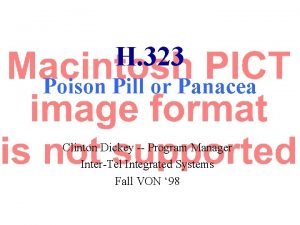Poison pill A poison pill is a strategy











- Slides: 11

Poison pill A poison pill is a strategy that tries to create a shield against a takeover bid by another company by triggering a new, prohibitive cost that must be paid after the takeover.

There are different types of poison pills Flip. Over Shadow pill Flip-In Chewable pill Back-End Plans Bank. Mail pill Voting Plans

Flip-in • Flip-in A "flip-in" allows existing shareholders (except the acquirer) to buy more shares at a discount. Management offers shares to investors at a discount if an acquirer merely purchases a certain percentage of the company. The discount is not available to the acquirer, and so it becomes extremely expensive for that acquirer to complete the takeover. Experts estimate that it would cost an unwanted bidder, on average, four to five times more to “swallow” a poison pill in order to acquire a target

Flip -over A "flip-over" allows stockholders to buy the acquirer's shares at a discounted price after the merger A ‘’flip-over’’ allows stockholders to buy the acquirer’s shares at a discounted price after the merger. The holders of common stock of a company receive one right for each share held, bearing a set expiration date and no voting power. In the event of an unwelcome bid, the rights begin trading separately from the shares.

Back-End Plans • Back-End Plans It is also known as note purchase rights plans. The first plan was developed in 1984. Under back-end plan share the holder receive a right dividend which give share holder ability to exchange this right along with the share of stock for cash or securities that are equal in value to a specific “back-end” price stipulated by the issuers board of directors.

Voting Plans This poison pill strategy is designed to dilute the controlling power of the acquirer. Under this plan, the target company issues a dividend of securities, conferring special voting privileges to its stockholders

Shadow pill A bidder cannot simply look at a target company and conclude from the fact such a defense. Targets may simply adopt a pill after a bid has taken place A company may also have a poison pill which is not openly advertised

Chewable pill These are pills that disappear, or are brought to shareholders vote, if a company receives a certain type of offer such as a certain price or type of consideration E. g. If Company A wants to take over Company B it may have to pay minimum price set by the Board of Company B else poison pill will be triggered

Bank Mail Pills • Bank mail defense wherein the bank of a target firm refuses financing options to firms with takeover bids thereby having the triple impact of imposing financial restrictions upon the acquirer, increasing transaction costs in locating another financing option and also buying time for the target company to put more defenses in place.

Golden Parachutes Special lucrative compensation agreements that the company provide to Top management • it may be used both as a preventive measure and as an active measure • It is triggered by some predetermined ownership of stock by an outside entity • Silver Parachutes if it is given to most of the firms employees •

Greenmail It refers to the payment of a substantial premium for a significant shareholder’s stock in return for the stockholder’s agreement that he or she will not initiate a bid for control of the company




















